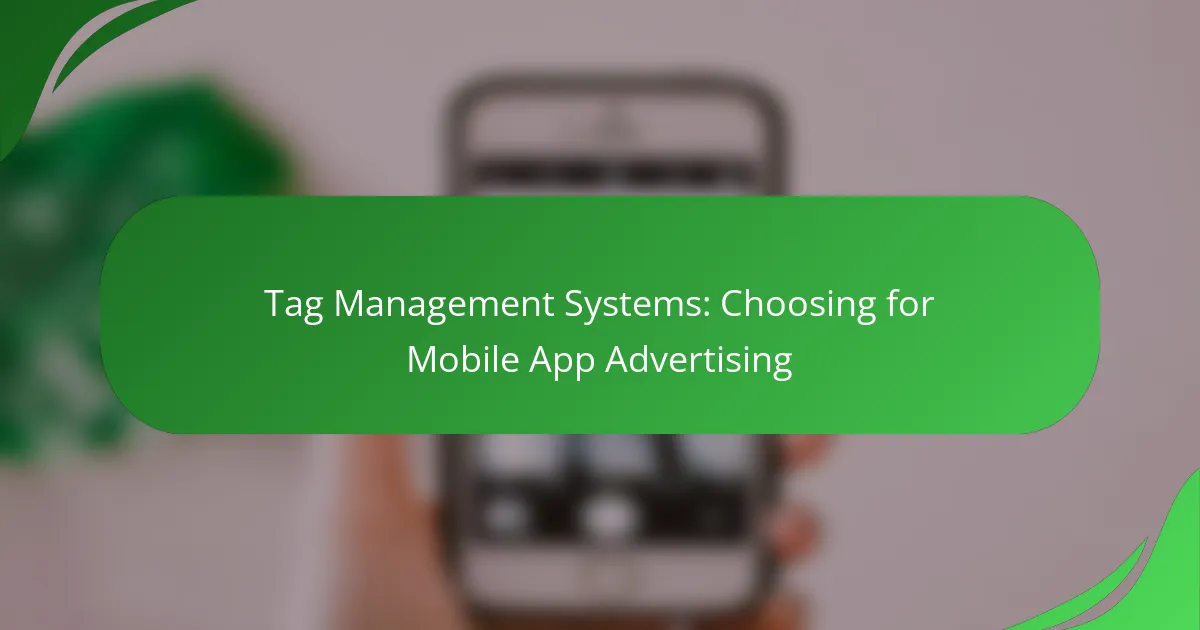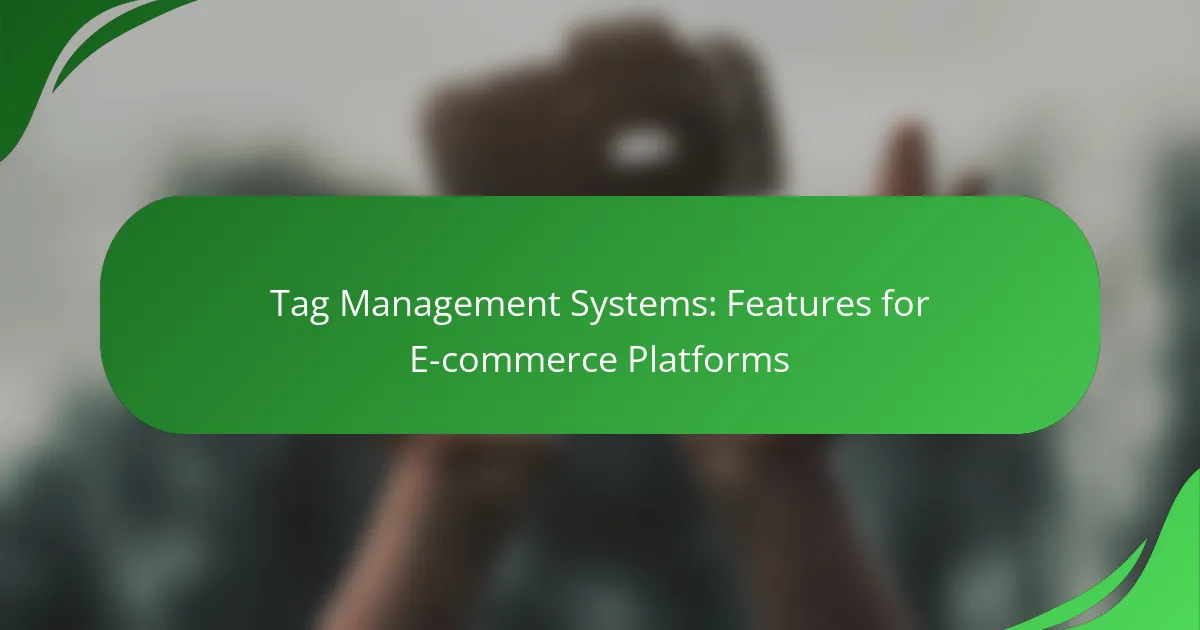Tag Management Systems (TMS) are essential tools for small businesses looking to optimize their digital marketing campaigns. By simplifying the management and deployment of marketing tags, TMS enable quick adjustments without requiring extensive technical expertise, ultimately leading to more effective and efficient campaigns. With enhanced data accuracy and reduced reliance on IT, small businesses can focus on what matters most: growing their brand and engaging their audience.

How can Tag Management Systems benefit small businesses in Canada?
Tag Management Systems (TMS) can significantly enhance the efficiency of digital marketing campaigns for small businesses in Canada by simplifying the process of managing and deploying various marketing tags. These systems allow businesses to quickly implement changes without needing extensive technical knowledge, leading to more effective campaigns and better resource allocation.
Streamlined campaign management
Tag Management Systems enable small businesses to manage all their marketing tags from a single interface, reducing the complexity of campaign management. This centralized approach allows for quicker updates and modifications, ensuring that businesses can respond to market changes or new opportunities swiftly.
For instance, a small business can add or modify tracking codes for Google Analytics or Facebook Ads without needing to involve IT or web developers, which can save time and reduce costs. This agility is crucial for small businesses that need to adapt their strategies frequently to stay competitive.
Improved data accuracy
Using a Tag Management System helps improve data accuracy by minimizing the risk of human error during tag implementation. With a TMS, businesses can ensure that tags are correctly placed and functioning as intended, which leads to more reliable data collection and analysis.
For example, if a small business wants to track conversions from a specific campaign, a TMS can help ensure that the tracking code is implemented correctly across all relevant pages. This accuracy allows businesses to make informed decisions based on solid data, ultimately enhancing their marketing effectiveness.
Cost-effective solutions
Tag Management Systems offer cost-effective solutions for small businesses by reducing the need for ongoing technical support and development resources. Many TMS platforms are available at a low monthly fee or even for free, making them accessible for businesses with limited budgets.
By streamlining the process of managing tags, small businesses can allocate their resources more efficiently, focusing on strategy and execution rather than technical challenges. This can lead to better ROI on marketing efforts, as businesses can invest more in their campaigns rather than in maintenance and troubleshooting.

What are the top Tag Management Systems for small businesses?
The top Tag Management Systems (TMS) for small businesses streamline the process of managing marketing tags, allowing for efficient tracking and analytics. These systems simplify implementation, reduce reliance on IT, and enhance data accuracy, which is crucial for effective digital campaigns.
Google Tag Manager
Google Tag Manager (GTM) is a free and user-friendly TMS that enables small businesses to manage and deploy marketing tags without extensive coding knowledge. It offers a straightforward interface and integrates seamlessly with Google Analytics and other Google services, making it a popular choice.
To get started with GTM, create an account, install the GTM container code on your website, and begin adding tags through the interface. Be mindful of common pitfalls, such as not testing tags before publishing, which can lead to data inaccuracies.
Adobe Experience Platform Launch
Adobe Experience Platform Launch is a robust TMS designed for businesses looking for advanced features and integrations. While it may have a steeper learning curve compared to GTM, it offers powerful capabilities for managing complex marketing ecosystems.
Consider using Adobe Launch if your business already utilizes Adobe products, as it integrates well with them. However, ensure you have the resources to invest in training and support, as the setup can be more involved than simpler alternatives.
Tealium iQ
Tealium iQ is a comprehensive TMS that provides extensive customization options and real-time data management. It is particularly suited for businesses with diverse digital marketing needs, as it supports a wide range of integrations and allows for detailed audience segmentation.
When using Tealium iQ, take advantage of its features like the EventStream API for real-time data collection. However, be prepared for potential costs, as Tealium typically operates on a subscription model, which may not be ideal for all small businesses.

How do Tag Management Systems simplify digital campaigns?
Tag Management Systems (TMS) streamline digital campaigns by allowing businesses to manage and deploy tracking codes from a single interface. This reduces the need for extensive coding knowledge and minimizes the risk of errors, making it easier for small businesses to implement and adjust their marketing strategies.
Centralized code management
Centralized code management enables businesses to store all tracking codes in one location, simplifying updates and maintenance. Instead of editing code on multiple pages or platforms, users can make changes in the TMS, which automatically applies them across the entire site.
This approach reduces the risk of inconsistencies and errors, ensuring that all tags function correctly. For small businesses, this means less time spent on technical tasks and more focus on marketing efforts.
Faster deployment of tags
With a TMS, deploying new tags can be accomplished in minutes rather than days. Users can quickly add or modify tags without needing to involve developers, which accelerates the implementation of marketing campaigns.
This speed is crucial for small businesses that need to respond quickly to market changes or promotional opportunities. By enabling rapid deployment, a TMS helps maintain a competitive edge in a fast-paced digital environment.
Enhanced tracking capabilities
Tag Management Systems provide enhanced tracking capabilities by allowing businesses to implement advanced analytics and tracking codes easily. This includes tools for monitoring user behavior, conversion rates, and other key performance indicators.
Small businesses can leverage these insights to make data-driven decisions, optimizing their campaigns for better results. Additionally, TMS often integrates with popular analytics platforms, making it easier to analyze data in one place.

What are the key features to look for in a Tag Management System?
When selecting a Tag Management System (TMS), prioritize features that enhance usability, integration, and data processing. A good TMS simplifies the management of marketing tags, enabling small businesses to implement and adjust tracking without extensive technical knowledge.
User-friendly interface
A user-friendly interface is crucial for small businesses that may lack dedicated IT resources. Look for a TMS that offers intuitive navigation, drag-and-drop functionality, and clear labeling of features. This will help users quickly learn how to add, edit, or remove tags without extensive training.
Consider platforms that provide visual previews of tags and their placements. This feature allows users to see how tags will function on their site before going live, reducing errors and improving overall efficiency.
Integration capabilities
Integration capabilities determine how well a TMS can connect with other tools and platforms. Ensure that the system supports popular marketing and analytics tools, such as Google Analytics, Facebook Pixel, and email marketing services. This will streamline data collection and enhance your marketing efforts.
Check if the TMS offers pre-built integrations or APIs for custom solutions. This flexibility allows businesses to adapt the system to their specific needs, ensuring that all marketing efforts are cohesive and data-driven.
Real-time data processing
Real-time data processing is essential for making timely marketing decisions. A TMS that processes data instantly allows businesses to track user interactions and campaign performance as they happen. This capability enables quick adjustments to marketing strategies based on live data.
Look for systems that provide real-time reporting dashboards. These dashboards should offer insights into user behavior and tag performance, helping small businesses optimize their campaigns effectively and efficiently.

What are the costs associated with Tag Management Systems?
The costs of Tag Management Systems (TMS) can vary significantly based on the features and services offered. Small businesses should consider both free options and subscription models, as well as the potential return on investment from using these tools effectively.
Free options like Google Tag Manager
Google Tag Manager (GTM) is a popular free option that allows users to manage tags without extensive coding knowledge. It provides essential features for tracking and analytics, making it ideal for small businesses looking to minimize costs while still gaining insights into their digital campaigns.
While GTM is free, users should be aware of the learning curve associated with setting it up and optimizing its use. Investing time in understanding its functionalities can lead to better data management and improved campaign performance.
Subscription models for premium features
Many Tag Management Systems offer subscription-based models that provide advanced features such as enhanced security, custom integrations, and dedicated support. These subscriptions can range from moderate monthly fees to higher costs depending on the scale and complexity of the business’s needs.
Small businesses should evaluate their specific requirements before committing to a subscription. Assessing the potential benefits against the costs can help determine if premium features are worth the investment.
Cost comparisons among leading platforms
When comparing costs among leading Tag Management Systems, it’s essential to look at both free and paid options. Platforms like Adobe Launch and Tealium offer robust features but typically come with higher price tags compared to free solutions like GTM.
For a clearer picture, small businesses can create a simple comparison chart that outlines the features, pricing, and support options of different TMS. This can aid in making an informed decision based on budget and feature needs.

What are the prerequisites for implementing a Tag Management System?
Before implementing a Tag Management System (TMS), businesses should have a clear understanding of their digital marketing goals and the technical resources available. This preparation ensures that the TMS aligns with their objectives and can be effectively integrated into existing workflows.
Understanding digital marketing goals
Clearly defined digital marketing goals are essential for successfully implementing a Tag Management System. These goals may include increasing website traffic, improving conversion rates, or enhancing customer engagement. By identifying specific objectives, businesses can tailor their tagging strategies to measure and optimize performance effectively.
Consider the types of campaigns you plan to run. For instance, if your focus is on lead generation, tags should be set up to track form submissions and user interactions. Alternatively, for e-commerce, tracking purchase behavior and cart abandonment becomes crucial.
Regularly reviewing and adjusting these goals is important, as digital marketing landscapes can change rapidly. Establishing a framework for periodic assessment will help ensure that your TMS remains aligned with your evolving marketing strategies.



